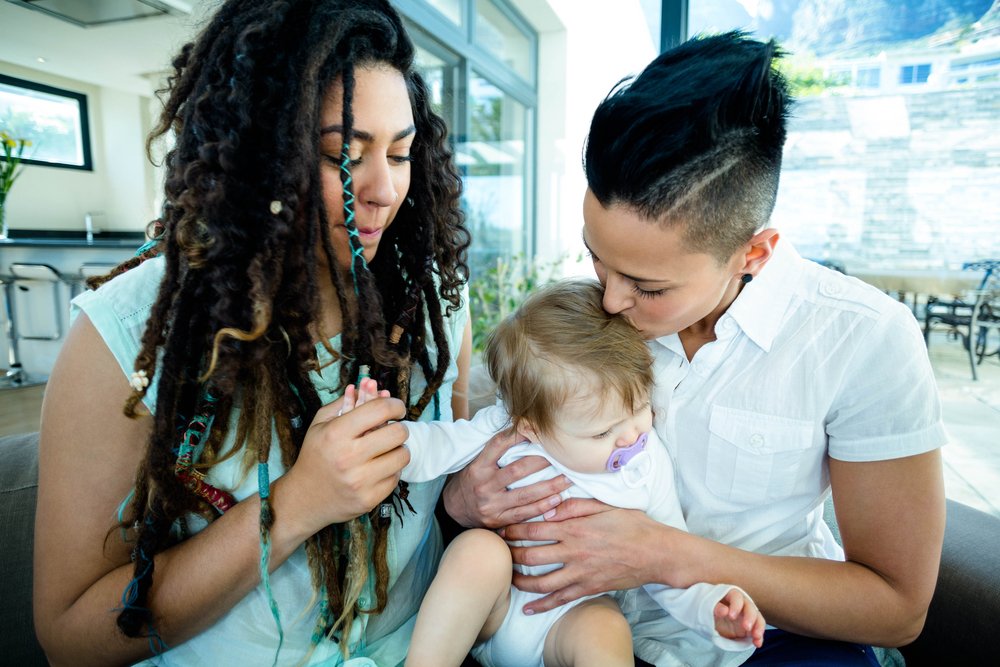From mutual support and solidarity to a sense of belonging, there are many ways 'family' – including our own chosen tribe – can help us. So, if you're asking 'why is family important for happiness?', Dee Marques has six key reasons to explain just that...
Family is one of the building blocks of society, and so its structure and role reflect social changes. Over the past 30 years, the traditional family unit has evolved significantly. Right now there isn’t a single concept of family that applies universally. But although family structure may have changed, its importance has not. In fact, there are many reasons why family is important for happiness.
Sure, we can’t choose our “blood” family. In most cases, family interactions are a mix of great and not-so-great experiences. But we can make up for that by choosing our “adopted” family members, a tribe of people who aren’t related to us, but who show support and prove they’re there for us so we don’t feel lost in times of need.
Indeed, blood isn’t always thicker than water. As someone who spent most of her life away from relatives, I learned that actions speak louder than words (or rather, than blood ties). Over the years I’ve been able to count on the support of people who were unrelated to me, in different countries and through different life stages. My family wasn’t always there, but being close to “my tribe” helped me push through tough times.
This has been defining in my own quest for well-being, so in this article we'll look at why family is essential for happiness and the benefits of having a close relationship with our loved ones.
Why is family important for happiness: what science says
One of the reasons why family is necssary for happiness is because it (usually) provides financial stability in our early years. Having our basic needs covered is crucial when it comes setting the basis for a happy life.
But studies show that the link between family and happiness extends beyond money or possessions. Researchers followed up hundreds of families for a decade and found that the quality of family bonds mattered more to overall happiness than income.

Family units have evolved shutterstock/wavebreakmedia
All over the world, researchers found that support is one of the reasons why family is important for happiness. And this support goes both ways: according to a study, nearly 70 per cent of parents depend on their children for emotional support. And research shows that knowing someone has your back can counter stress, depressive symptoms, and low self-esteem.
The sibling relationships is especially important to emotional well-being. In one survey, more than 60 per cent of participants said their sibling was their best friend. Evolutionary biologists say that this could be because we share half our genes, so we’re predisposed to closeness and we respond positively to it. But depending on our background, there could be some differences in how family contributes to happiness.
RELATED: Toxic Siblings: How to Recognise and Deal With Them
A cultural perspective
As I wrote in a previous article, the concept of happiness varies across cultures, and so does the “recipe” for it. Family is a central to happiness in every culture, but in some countries this is more profound. Family ties often have a stronger weight in collectivist cultures, those where the well-being of society is above the individual.
For example, in Mexico, a World Values Survey found that nearly 95 per cent of those interviewed considered family very important in life. Mexicans rank family as one of the most trust-inspiring institutions and a source of emotional, financial and practical support.
“All over the world, researchers found that support is one of the reasons why family is important for happiness.”
In India, also known for its collectivist culture, many important life decisions are taken in consultation with family members. The boundaries between self and relatives are somehow blurred, so the common view is that a happy and complete individual can only exist within the family unit.
When answering the question 'why is family important for happiness?', we can also look at Western societies. In the US, a survey showed that more than 70 per cent of participants said family was crucial to their identity. The link between healthy family ties and identity is also strong in Scandinavian countries like Sweden, Denmark, and Norway, where parent-child relationships are meant to facilitate independence, individual responsibility, and promote the development of healthy identities.
But, regardless of our cultural background, there are (at least) six reasons why family is important for happiness:
6 reasons why family is important for happiness
1. Mutual support and solidarity
The people we consider family foster a sense of reciprocity, dependability and mutual reliance. Caring for our loved ones and being looked after by them brings a rewarding sense of achievement.
2. A shelter from the outside world
Healthy families are a place of refuge from problems and offer a safety network when things go wrong. Think about the boost you get when it’s hard to cope with life’s hurdles and you spend time doing something fun with your loved ones. And it’s more than a feeling: studies found that quality leisure time with our family can fight off and manage stress.

Support and shelter: two reasons why family is important shutterstock/Monkey Business Images
3. Encouragement
A UK study showed that the encouragement of parents and grandparents was the main reason why teenagers got involved in altruistic cases. And the link between altruism and greater well-being is well documented – you probably know that it’s good to be good.
RELATED: The Power of Kindness
4. Unconditional love and support
Knowing that you have a network of people you can always count on benefits our physical and emotional health. Our “tribe” accepts us for who we are, which is key to a positive self-concept. And research shows that the benefits go both ways, to those giving and those receiving love and support.
5. Shared experiences
We’re all in this together, and that helps us build stronger connections and enrich our appreciation for others. Studies show that shared experiences can amplify the effect of positive emotions. Even remembering shared experiences can give a boost to our well-being.
6. A sense of belonging
Here’s one last reason why family is important for happiness. Researchers compared people with and without a strong sense of belonging. The results were clear: those who felt they belonged to a supportive group reported being happier. According to psychologists, belonging is a primal need, and meeting this need helps us be more resilient – and happier too.
RELATED: Building Resilience: 5 Strategies For Thriving
As you can see, there’s much to be won from building strong and meaningful relationships with our loved ones, whether they’re relatives or “adopted” family members. So why not take a minute to think about what can you do today to show them your support? ●
Why is your family important to you? We'd love to hear your comments below. Or why not start a thread in our relationships and friendships forum?
happiness.com | The fine art of being: learn, practise, share
Are you a happiness.com member? Sign up for free now to:
■ enjoy our happiness magazine
■ share and support in our happiness forum
■ develop with free online Academy courses
Written by Dee Marques
 A social sciences graduate with a keen interest in languages, communication, and personal development strategies. Dee loves exercising, being out in nature, and discovering warm and sunny places where she can escape the winter.
A social sciences graduate with a keen interest in languages, communication, and personal development strategies. Dee loves exercising, being out in nature, and discovering warm and sunny places where she can escape the winter.



Join the conversation
You are posting as a guest. If you have an account, sign in now to post with your account.